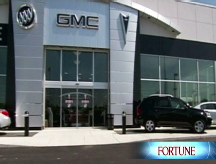GM failure: The shockwave
If General Motors declares bankruptcy, industry watchers say, the entire domestic auto industry could be badly hurt.
NEW YORK (CNNMoney.com) -- If General Motors really does run out of money by the end of the year, as it predicted was possible, the impact would be felt far and wide - to hundreds of suppliers, rival automakers and ultimately dealers across the nation.
"Once the first domino falls, it rapidly takes out all the other dominoes," said Dennis Virag, president of the Automotive Consulting Group.
Suppliers would be among the first to feel those effects since GM only manufactures the body, the engine and the transmission used in its cars.
In the United States alone, GM spends $31 billion on parts from 2,100 different suppliers. These include the "direct suppliers" involved in producing a vehicle - those that provide everything from steering wheels and seatbelts to brakes and airbags - as well as "indirect suppliers" - those that make things such as gloves, protective eyewear, shop rags and lightbulbs.
Although lawmakers appear to be souring on providing a $25 billion bailout to automakers, the impact of a GM failure on the industry as a whole - and therefore the economy as a whole - is weighing heavily in their decisions.
So far this year, 23 major auto-related companies, most of them parts suppliers, have filed for bankruptcy, according to consulting firm Grant Thornton. They are struggling since car makers have cut back as sales have slowed and raw-material prices have risen.
"I would argue that in today's environment, with the stress that's already on the supply base, they can't take another hit," said Kimberly Rodriguez, a principal at Grant Thornton's automotive practice. "The ripple effect would be huge," she added.
As supplier companies fail, that would have a direct impact on Ford and Chrysler, since the three domestic auto manufacturers share about 70% of their suppliers, Rodriguez estimated.
One executive who works for a Detroit automaker, and who did not want to be named, said the impact of GM - or any of the three - failing would be dramatic and very challenging.
Not all those affected would suffer equally, but it is hard to predict which companies would be hit hardest, because the relationships among the various suppliers and automakers are complex, he said.
A GM failure would also affect about 14,000 dealers in the United States, according to the industry newspaper Automotive News. That is almost half of the nation's 29,000 dealerships that specialize in domestic vehicles.
But even if those 14,000 GM dealers also offer foreign cars, the risk of losing their supply of domestic vehicles could force many of them out of business, said Paul Taylor, an economist with the National Automobile Dealers Association. Already, he noted, the industry is expected to lose about 700 dealers by the end of this year, up to 80% of which will be domestic-brand stores.
Car companies are wary of publicly discussing the possibility of financial disaster because it makes it harder to sell the cars that are on dealer lots today, said consultant Virag. Customers don't want to buy from a company they fear may soon be insolvent.
"It's a difficult situation that the automakers are in," said Virag. "To talk about bankruptcy would only exacerbate the situation, but not talking about it isn't helping."
But whether a bankruptcy would help suppliers and everyone dependent upon GM is still uncertain.
If it is determined that GM could file for bankruptcy under Chapter 11 rules, rather than a Chapter 7 liquidation, the automaker could potentially reorganize. That way the company could seek permission to pay outstanding bills to "critical suppliers" that it absolutely needs, said Robert Sanker, a Cleveland bankruptcy attorney who has represented creditors of bankrupt auto suppliers.
Still, Sanker said, relatively few suppliers would be granted "critical supplier" status in court, leaving many more that would have payments cut off.
And GM is says it is not considering Chapter 11, but rather is continuing to seek government assistance. "Bankruptcy reorganization is not an option for GM because it would create more problems than it would solve," said spokesman Dan Flores. ![]()



